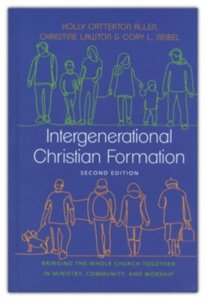A family of faith more fully reflects the body of Christ when generations come together, and each individual brings their unique, God-given gifts. The authors of Intergenerational Christian Formation outline five benefits of intergenerational ministry for the church and members in different stage of life.
Intergenerational faith experiences uniquely nurture spiritual growth and development in both adults and children. We must clarify that we are not recommending that all activities of a faith community be conducted with all ages present. There are powerful and valid reasons to gather by age or stage or interest. Spiritual growth and development can and indeed does happen when teens gather separately, when the seniors meet for mutual support and care, and when the preschoolers join together and learn. We are proposing that frequent and regular cross-generational opportunities for worship, learning, outreach, service, and fellowship offer distinctive spiritual benefits and blessings.
1. Belonging
“Belongingness” is the third in Maslow’s hierarchy of needs. After physiological needs and safety needs are met, human beings seek—and need—places to belong. Belongingness is particularly important in the realm of spiritual care and formation. Healthy belongingness offers support for people in difficult situations, release from shame through forgiving grace, and opportunities for authenticity. “Being wanted, welcomed, invited, and included are some of the most mending experiences on the planet,” according to one spiritual formation leader. Intergenerational faith communities provide experiences that foster this deep sense of belonging in children, teens, and adults; all feel welcome and received.
2. Support for troubled families
All faith communities have families who are facing severe difficulties. How does bringing the generations together uniquely benefit these families? Sharon Koh, senior associate pastor of Evergreen Baptist Church – Los Angeles in Rosemead, California, says “When our church is intentional about cross-generational interactions, it expands the concept of family beyond the nuclear family alone … Because of this new concept of family, many inadequacies in the nuclear family can be made up for, in Christ’s name.”
3. Better use of resources
One reason to avoid age segregation in faith communities is the uneven distribution of resources. Chad Hall writes that “Both young and old have resources to share. Generational homogenization results in an overabundance of one type of resources in certain congregations. Many older-generation churches have plenty of money and facilities but lack the energy and fresh vision younger congregations have aplenty.” Relatively new church plants made up primarily of Millennials and Gen-Zers typically struggle with one aspect of this imbalance: funding their ministries and covering the cost of meeting spaces. Many in their twenties and thirties in these young churches are in debt and may give only five or ten dollars a week. On the other hand, a great strength of these churches is that the leaders, as well as the participants, are typically asking “How can we do things differently? How can we modify our approaches?” Intergenerational faith communities bring together the young, fresh thinkers with the older, wiser veterans, creating an integrated profusion of resources.
4. Character growth
So many forces drive generations apart, but moderns and post moderns can coexist. It requires humility, mutual submission, and respect for different strengths and passions. Those virtues don’t happen easily. They emerge as we teach them and model them. Chad Hall believes that bringing all the generations together yields unique opportunities for character growth. He has experienced the particular type of conflict that intergenerational churches encounter and says that negotiating contradictory generational priorities can breed godliness. Churches who value their young and their old will have to deal with clashing perspectives, which may slow things down, make decisions harder to negotiate, force compromise on difficult matters, and automatically elevate the value of relationship over that task. But when generations collide, the subsequent conflict reminds everyone, “Church is not just about me … Who knew that church could be the cure for narcissism?”
5. Spiritual development
The Search Institute, which has been conducting global research on spiritual development for fifty years, notes that one fundamental aspect of spiritual development is interconnecting, that is, linking oneself to communities, practices, narrative beliefs, and traditions that give meaning to human experiences across time. The best way for most people to link to the narratives, beliefs, practices, and traditions of their faith communities is to participate actively in intentionally age-integrated experiences with others in those faith communities. Truly intergenerational communities welcome children, emerging adults, recovering addicts, single adults, widows, single parents, teens whose parents are not around, the elderly, those in crisis, empty nesters, and struggling parents of young children into a safe but challenging place to be formed in the image of Christ.
 Taken from Intergenerational Christian Formation: Second Edition by Holly Catterton Allen, Christine Lawton, and Cory L. Seibel. Copyright (c) 2023 by Holly Catterton Allen, Christine Marie Lawton, and Cory Lane Seibel. Used by permission of InterVarsity Press. The book is available at Intervarsity Press, Cokesbury, and Amazon.
Taken from Intergenerational Christian Formation: Second Edition by Holly Catterton Allen, Christine Lawton, and Cory L. Seibel. Copyright (c) 2023 by Holly Catterton Allen, Christine Marie Lawton, and Cory Lane Seibel. Used by permission of InterVarsity Press. The book is available at Intervarsity Press, Cokesbury, and Amazon.
Related Resources
- The Benefits of Intergenerational Christian Formation featuring Holly Allen — Leading Ideas Talks podcast video | Podcast audio version | In-depth interview
- Intergenerational Ministry for the Post-pandemic Church by Doug Powe
- Why Making Your Church Multigenerational Is Worth the Effort by Chuck Lawless
- Intergenerational Ministry and the Small Church by Brandon J. O’Brien







